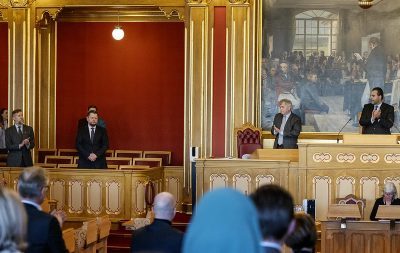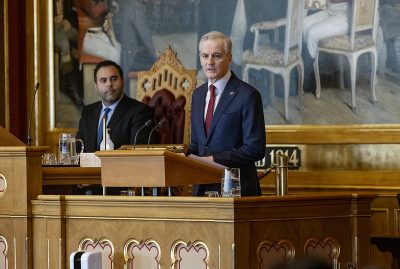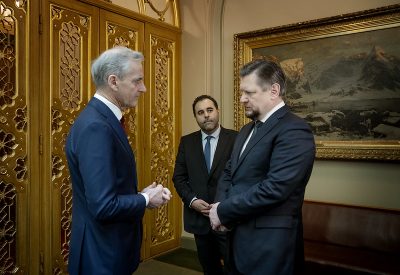Norwegian politicians across all party lines stood up and applauded long and loud for the people of Ukraine at a special session of Parliament on Thursday. Prime Minister Jonas Gahr Støre had invited Ukrainian Ambassador Viacheslav Yatsiuk to observe the special session, and it turned into a special moment as well.

The session occurred exactly a week after Russian President Vladimir Putin invaded Ukraine, setting off what’s already become an international crisis.
“The war in Ukraine is shaking an entire world and every one of us,” Støre said in his opening remarks. “We haven’t seen a brutal invasion of a large, peaceful neighbouring country in Europe since the second world war. The Ukrainian people’s fight, for their own lives and their own freedom, is happening close to us and touching all of us.”
Right after noting that the Ukrainian people “are fighting a heroic battle for their country,” Støre turned to the president of the Norwegian Parliament, Masud Gharahkhani, to say that he had asked Ukraine’s ambassador to be present in Parliament when he declared that “on behalf of everyone in Norway, I want to express our solidarity and support. Ambassador, your people have our full solidarity.”
That’s when all Members of Parliament rose for a standing ovation, which was warmly received by the ambassador representing Ukraine. Ambassador Yatsiuk, who has been stationed in Oslo since 2016, later told Norwegian Broadcasting (NRK) that he was “very glad” for the support, also that Støre specifically stated that Ukrainians are also fighting “for our (Norwegian) ideals, our values. They’re fighting for peace, for democracy and for a Europe where we settle conflicts with peaceful means, not military power.”
‘Will get worse before it gets better’
Støre claimed that Putin “has gravely underestimated the Ukrainian people and the strength of the Ukrainian defense. President Putin has underestimated the international reaction and the solidarity within NATO and the EU. He has underestimated the power within democracy.”
At the same time, however, Støre warned that the situation “will get worse before it gets better.” Russian forces backed by troops from Belarus “are on their way into Ukrainian cities,” with increased use of heavy artillery and cluster bombs. Death tolls and destruction can increase in the days and weeks ahead, and even more people will feel forced to flee to the west.

“They will meet a Europe and a Norway that takes good care of people on the run,” Støre said. Most all Ukrainian refugees so far are crossing the Ukrainian border to neighbouring Poland, Slovakia, Hungary, Romania and Moldova, but Norway will be expected, and is preparing, to take in several thousand.
Støre’s main mission on Thursday was to offer a government status report on the war to Parliament and confirm how Norway and at least 140 other countries (given a vote at the UN on Wednesday) “condemn in the strongest of terms Russia’s attack on Ukraine.” He called it a “serious and long-planned violation of the rule of law,” noting how Russia raised its military threat while also making “impossible” political demands of NATO and the US. He stressed that coordination within NATO and between NATO and the EU has been “extremely good” and that members were more unified than ever.
“I have been at many NATO meetings in my time (Støre was Norway’s foreign minister from 2005 to 2012, when NATO chief Jens Stoltenberg was Norway’s prime minister) but I’ve never experienced such unity as I did on Friday (February 25, when leaders of all NATO members plus Sweden, Finland and the EU assembled for an emergency session after Russia’s invasion),” Støre said. Norway is a founding member of NATO but has never joined the EU, leading to renewed calls that Norway should.
Consequences for Norway
Støre said the invasion of Ukraine has also raised immediate consequences for Norway. Preparedness has been boosted, especially in Northern Norway, also for cyber attacks. Norway has sent weapons to Ukraine and more soldiers to fellow NATO member Lithuania, he acknowledged, but “Norway is not at war.” He added that there is “no information that now indicates Russia is planning or sees itself well-served by a military conflict with Norway or other NATO countries,” which would trigger a collective response.
All NATO countries, however, “must be on guard,” especially Norway given its location as a neighbour of Russia’s in the north. Putin has stated that he’d increased preparedness of Russia’s nuclear weapons, many of which are based on the Kola Peninsula that borders Norway’s northern region of Finnmark. Støre conceded that can set off “increased military tension and activity in the north.” He stressed that “nothing indicates Russia can gain on moving its conflict into our area,” adding, however, that “we are following activity closely, on behalf of ourselves and our allies.”

Meanwhile, preparations continue for the long-planned NATO military exercises in Northern Norway known as “Cold Response.” More than 30,000 soldiers from around 25 countries will take part later this month, with most of the training going on between Bodø and Tromsø and not close to the Russian border. Støre stressed that the exercises are not a response to Russia’s attack on Ukraine but have taken on new meaning. “They will be an important demonstration of allied solidarity and strength,” he said, “and show that Norway is part of the alliance, relevant for the alliance and demonstrate other allies’ ability to respond on behalf of Norway.”
Støre outlined assistance already given to Ukraine, stressed that Norway will continue to be a “stable and reliable” supplier of energy to Europe, defended Norway’s decision to send weapons to Ukraine and confirmed that Norway will be ready to take in “our share” of refugees from Ukraine. Local communities and the state are preparing to receive refugees, but Støre asked Parliament to “be prepared that a large number of refugees from Ukraine … will be demanding to handle.”
‘Bilateral relationship’ with Russia has regressed
He, like many other leaders, claimed that Putin’s invasion of Ukraine marks a new era for Europe, for better and worse. It has unified not just NATO but Europe itself, noting that the EU commission’s president Ursula von der Leyen “was probably right when she said that more has happened with the EU’s cooperation on defense and security in the past week than in the past 20 years. There’s reason to believe that will last.”
The attack on Ukraine, however, “will have consequences for our bilateral relation to Russia. As long as President Putin steers Russia, there is no doubt: The long-term relationship between Norway and Russia has changed as a result of the invasion of Ukraine.” It has regressed, Støre said, with the government “reducing political contact with Russian authorities.” He noted that “we are neighbours and will take care of that,” but in a “long string of others areas, our cooperation with Russia will for the forseeable future be ended, postponed or scaled down.”
Even during the chilliest period of the Cold War, however, Norway maintained “practical cooperation” with the former Soviet Union. “We must always work for the lowest possible tension and great possible degree of security in our neighbouring areas,” Støre said.
Within Norway, Støre added, “we are now living through dramatic days … and things that were important before are less important now. We must unify us around what’s most importat now. Choices we make now will have great consequences. It’s a great strength for our country when those of us in this room, across party lines, can come together and find solutions that have broad support. The Norwegian people expect that of us.”
newsinenglish.no/Nina Berglund

